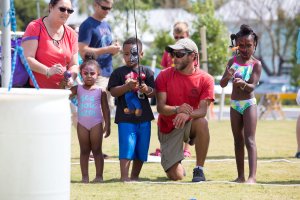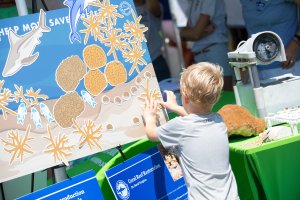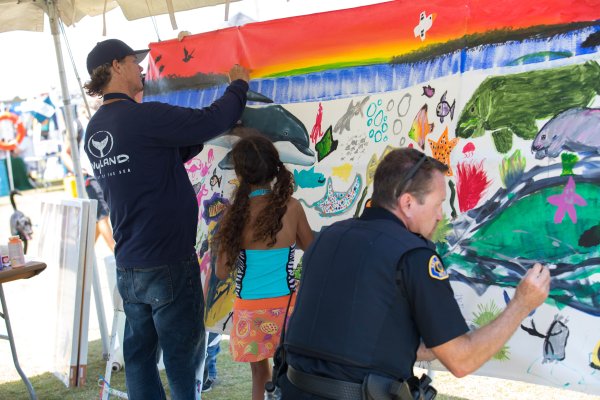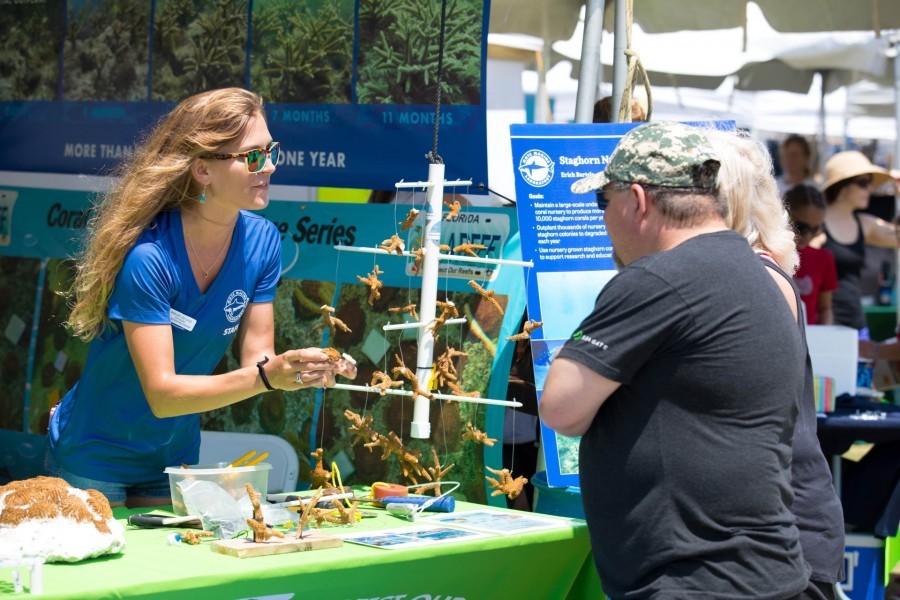Thousands gathered to celebrate coral reef ecosystems, conservation and Florida Keys culture during Mote’s Ocean Fest: A Community Celebration on April 14 at the Florida Keys National Marine Sanctuary’s Eco-Discovery Center and the beautifully renovated Truman Waterfront Park in Key West.
Mote’s eighth annual Ocean Fest lifted spirits and raised funds for coral reef research and restoration through a day of family fun, crafts, games, music, food and educational displays highlighting the Keys’ treasured marine resources. Attendees explored conservation-focused exhibits, discovered live animals in marine touch pools, enjoyed a kids’ fishing clinic with Boy Scouts of America Florida Sea Base, browsed the works of local marine artists and more than 60 vendors, danced to live bands, and more.
Attendees met Mote scientists who study and restore coral reefs and study other Keys ecosystems and species. Many of those scientists base some or all of their work at Mote’s Elizabeth Moore International Center for Coral Reef Research & Restoration on Summerland Key (IC2R3).


IC2R3 Science Director Dr. Erinn Muller stepped up to the event stage to thank attendees:
“At Mote we work to research coral health and disease, ocean acidification, chemical and physical ecology and environmental health,” Muller said. “We are grateful that our region has beautiful natural resources such as coral reefs and mangroves, which provide habitat for fish and other marine life as well as protect our shorelines from storms, large and small. We at Mote want to ensure that we do everything we can so that these resources are here for future generations, but we can’t do that without the support of our community. Thank you to everyone who has joined us today, and everyone who has been and still is working tirelessly toward this goal. You are the reason we have this festival to celebrate each other and the environment around us. You are helping to drive positive change.”
Muller introduced Key West Mayor Craig Cates.
“Today is for Mote and for everybody that’s involved in protecting our environment and understanding the effects that so many people have had on it over the years,” Cates said. “Growing up here, we just thought these natural resources were going to last forever. Now we understand the impact we’ve had on them, and now we want to protect them for our grandkids and future grandkids, so they can see the same things we’ve been blessed enough to see. Thank you for being here, thank you to Mote and to everyone who worked so hard to put this together. Have a great time.”
Then marine artist Wyland took the stage for a painting demonstration set to live music by Howard Livingston & the Mile Marker 24 Band. During the demo, Wyland’s art pieces were sold to raise funds for Mote and the Wyland Foundation.
“We have common goals: clean water, healthy oceans and beautiful reefs,” Wyland said. “It’s a great honor.”

About Mote’s Elizabeth Moore International Center for Coral Reef Research & Restoration (IC2R3)
Mote’s IC2R3 on Summerland Key is a global research epicenter where Mote scientists and colleagues from around the world work to advance the understanding of the Florida Keys’ intricate and precious marine ecosystems, while also implementing a major science-based coral restoration initiative celebrated each year at Mote’s Ocean Fest.
In 2017, IC2R3 sheltered Mote’s coral restoration gene bank from Hurricane Irma and allowed for exciting triumphs. In 2016 and 2017 Monroe County Tourist Development Council funded a Mote-led partnership including local volunteer citizen scientists, staff from the Florida Keys National Marine Sanctuary, the Florida Park Service and Florida Department of Environmental Protection, to plant over 12,000 coral fragments along Fort Zachary Taylor Historic State Park in Key West.
Also in 2017, Mote scientists and partners at IC2R3 published research in internationally respected peer-reviewed scientific journals, revealing that coral disease and ocean acidification interact in surprising ways. They also contributed to studies advancing knowledge of threatened staghorn coral genetics, population structure and benchmarks for restoration.
Beyond coral reefs, Mote scientists who use IC2R3 study myriad other topics, including: stone crab fisheries; ecosystem dynamics and resilience; ocean acidification and its effects on corals, sponges and seaweeds that compete for space; toxic chemicals carried by storm water runoff and other sources into the Florida Keys National Marine Sanctuary, and their effects on coral reef communities and species, including lobster.
Most of Mote’s Keys-focused research efforts are supported primarily by philanthropic donations to Mote and funds from the Protect Our Reefs specialty license plate and grant program (motereefplate.com).
2018 Ocean Fest sponsors and partners
Mote’s eighth annual Ocean Fest was made possible by the following generous sponsors and partners:
Sponsors: Protect Our Reefs; Publix Super Markets Charities; Mote Marine Laboratory; Florida Keys National Marine Sanctuary; Florida Department of State Division of Cultural Affairs; Margaritaville Resort & Marina, Key West; Islamorada Beer Company, Florida Keys & Treasure Coast; Hemingway Rum Co., Key West; The Galleon; Keys Weekly; and Five Star Claims Adjusting.
Partners: Coastal Conservation Association Florida; Florida Keys History & Discovery Center; Pirate Radio; National Oceanic and Atmospheric Administration; Wyland Foundation; Tunaskin Aquatic Apparel; Keys Energy Services; Boy Scouts of America Florida Sea Base; Gerd Rube; Howard Livingston & the Mile Marker 24 Band; Emily Springsteen; The Art of Sound, Key West, FL; Four Star Rentals; and Mellow Ventures Backcountry Outfitters.


